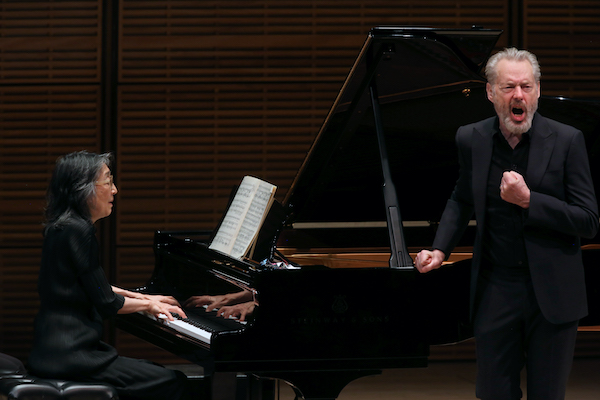Padmore, Uchida probe deeply in Beethoven, Schubert lieder at Zankel

Reverberations continue from the Beethoven’s 250th birthday party that wasn’t, due to the nearly concert-less year 2020.
Some have been loud, like the Philadelphia Orchestra’s nine-symphony cycle at Carnegie Hall this season. Others you have to lean forward to hear, such as the thoughtful exploration of three Beethoven songs and his cycle An die ferne Geliebte that opened Sunday afternoon’s recital by tenor Mark Padmore and pianist Mitsuko Uchida in Carnegie’s Zankel Hall.
Presented by Carnegie under the rubric “Great Singers II: Jula Goldwurm Pure Voice Series,” Padmore and his keyboard partner offered a distinctive version of what “great” and “pure” mean. Taking full advantage of the hall’s intimate dimensions, the duo mostly rejected theatricality in favor of inviting the audience to reflect on philosophical and poetic matters.
This seemed to be Beethoven’s preference anyway, considering his choice of texts and his manner of setting them. The program’s opening selection, Beethoven’s second setting of C.A. Tiedge’s poem “An die Hoffnung” (Op. 94), began hardly like a song at all, but rather a disquisition to music on the question “Does a God exist?” (Eventual conclusion: “Man should hope! Not question!”)
Of course, more tuneful moments and warmer emotions followed, but a mood of reflection persisted throughout the program, which concluded with the collection of Schubert’s last songs that was published after his death as Schwanengesang (Swan Song). Pianist Uchida had the una corda pedal down for much of the concert, not out of some sort of accompanist’s shyness, but the better to mesh with Padmore’s subtle inflection of the text in shades of mezzo piano to pianississimo.
Despite the tacked-on, sentimental title, there is nothing morose about the songs in Schwanengesang, with their moods ranging from ecstatic to angry to flirtatious. Schubert wrote them at the height of his powers, with an eye to robust sales among his fans. But even a song as seductive as the famous “Ständchen” or as apparently insouciant as the jaunty “Abschied” can reveal unexpected depths when dialed back a notch or two, as Padmore and Uchida did Sunday.
The tenor’s rock-solid breath support enabled him to project text with exceptional clarity and sustain long phrases even in the slowest tempos and softest dynamics, most notably in the icy opening bars of Schubert’s “Der Doppelgänger.” On the other hand, the fortissimo climax of that song provided a rare occasion for Padmore to fully unleash his piercing top voice and vibrato.
Uchida seemed a dream collaborator, following and enhancing every flicker of meaning in the singer’s delivery. While Beethoven had little interest in what he called “malerei” (painting), the pianist was able now and then to discreetly bring out a touch of scenery in Schubert, such as the watery ripples of “Liebesbotschaft” or the ghostly puffs of wind in “Die Stadt.”
At times one wanted Uchida’s piano sound and texture to assert itself a little more, to drive the meaning, but this wasn’t the day for such extroverted gestures. Likewise, Padmore avoided anything like “acting” his part, even in the first-person songs. It was as if impersonating the character might distract from his intense focus on the nuances of the text itself.
This approach especially suited the individual Beethoven songs, which also included the gently despondent “Resignation” and the starry night meditation “Abendlied unterm estirnten Himmel.” Even An die ferne Geliebte, essentially a love poem in six linked songs, maintained a certain “distance,” like the beloved herself—not at all to the music’s disadvantage, in this elevated performance.
Schwanengesang was posthumously assembled from two sets of songs Schubert had been working on, one to the somewhat conventional love poetry of Ludwig Rellstab, the other to the often sardonic verse of Heinrich Heine. Schubert, no stranger to bitter irony in his own life, responded to Heine’s lacerating lines with stark settings that uncannily anticipated the greatest of Heine song cycles, Schumann’s Dichterliebe. Padmore and Uchida made sure one heard the difference in poets, as this quasi-cycle turned the corner from Rellstab’s cheerful “Abschied” to Heine’s anguished “Der Atlas.”
For good measure, Schubert’s publisher added one more song to close Schwanengesang, “Die Taubenpost” (The Carrier Pigeon). The knowledge that this was the last song Schubert composed hangs over this literally flighty number, coloring it with a nostalgia that was heightened in the duo’s delicate performance Sunday. No further encore was needed, or offered.
The Galilee Chamber Orchestra, conducted by Saleem Ashkar, with violinist Joshua Bell, will perform music by Haydn, Bruch, Karim Al-Zand, and Beethoven 8 p.m. Friday at Carnegie Hall. carnegiehall.org
Carnegie Hall’s “Great Singers II: Jula Goldwurm Pure Voice Series” continues with soprano Elza van den Heever and pianist Vlad Iftinca performing music by Berg, Peter de Villiers, Wagner and Beethoven 7:30 p.m. April 7 in Carnegie’s Zankel Hall. carnegiehall.org